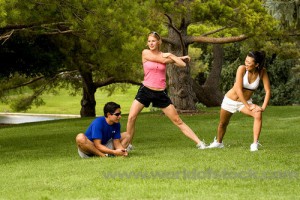Shoulder pain has a way of creeping into nearly every part of daily life. Simple movements — like reaching into a cabinet, fastening a seatbelt, getting dressed, or even finding a comfortable sleeping position — can suddenly become frustrating or downright painful....
Sleep plays a vital role in healing, recovery, and overall well-being. Unfortunately, hip pain can make getting a full night’s rest feel nearly impossible. Tossing and turning to find a comfortable position, waking up from sharp or aching pain, or starting the morning...
If you are struggling with lower back pain that radiates down your leg, you might have hit the internet searching for answers, only to find the terms “sciatica” and “herniated disc” discussed frequently. This is because both conditions can cause debilitating back...
Top Five Tips for Keeping your Muscles Healthy

If you exercise daily, it’s important to maintain muscle health in order to avoid tears and strains. Keeping your muscles healthy will also help you enhance your performance and allow you to gain more muscle strength.
Warm Up and Cool Down
Before beginning any sort of physical activity, it’s crucial to spend 10-20 minutes warming up. Focus on warming up the muscles you’ll be using during your workout. A brisk walk, a light jog, or light weight training can help your muscles prepare for more intense activities such as a long run, sprints, or heavy weight training.
After exercising, be sure to spend another 10-20 minutes cooling down. The cool-down process is similar to the warm-up process, except at a slower pace. Perform a less intense activity to allow your muscles to fully recover.
Stretch
Spending 10-15 minutes stretching your main muscle groups can drastically reduce muscle tears. Hold each stretch for 20 seconds to allow the muscles to become more flexible, and therefore less likely to sustain injury. Stretching out your muscles also helps them reach their full range of motion.
The best time to stretch is after your warm-up and before the intense activity. This way, your muscles will already be warm and they will stretch better.
Diet
What you eat greatly impacts the health of your muscles. Your diet helps your muscles strengthen, repair themselves, and function properly. It’s important to include protein, carbohydrates, healthy fats, vitamins, and minerals in your diet for healthy muscles.
Add the following foods to your diet for muscle health:
- Protein – Muscles are mostly made up of proteins. It’s important to include protein in your diet to replenish what is lost during workouts. Proteins include meat, poultry, seafood, eggs, and milk products.
- Carbohydrates – Carbohydrates provide fuel so you can perform physical activities. They also promote the release of insulin so your muscles can build new tissue. Include whole grains, fruits, and vegetables in your diet for carbohydrates.
- Fats – Unsaturated fats are helpful in muscle recovery. These fats are found in walnuts, flaxseed, fish oils, peanut oil, and olive oil.
- Vitamins and Minerals – Eating a balanced variety of healthy foods from those listed above will provide you with the essential vitamins and minerals you need for healthy muscles. Taking a daily multivitamin can also help your body obtain the nutrients it needs.
Hydrate
Staying hydrated is important for overall health, including blood flow, kidney function, and digestive functions. Water is also important for muscle health. It provides essential electrolytes that are necessary for muscle strength and control. It’s also necessary for building muscle. The average person should drink two liters, or half a gallon, of water per day which is eight 8-ounce glasses. When you’re very active, you lose a lot of water during workouts and should increase your total amount by a few glasses.
Exercise
This may seem obvious, but exercise is very important for maintaining muscle health. People who exercise have stronger muscles than others in their age group. Any kind of exercise that causes the body to work against gravity will help build muscle. Muscles will break down as time goes on without exercise.
Practice weight-bearing exercises such as running, jogging, jumping rope, and dancing. Adults should get at least 30 minutes of exercise daily.
Follow these simple tips to keep your muscles healthy, and you’ll find that your performance will increase and you’ll feel better overall.
For more information about improving your performance,click here to download our e-book, The Athlete’s Guide to Reaching Peak Sports Performance and Preventing Injury. This educational guide will help you understand common sports injuries, treatment methods and how to maintain fitness after an injury.




